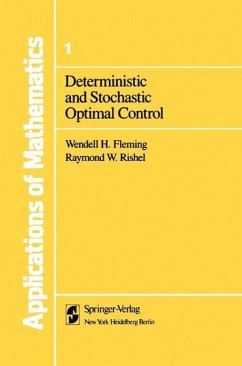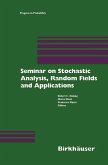128,95 €
128,95 €
inkl. MwSt.
Sofort per Download lieferbar

64 °P sammeln
128,95 €
Als Download kaufen

128,95 €
inkl. MwSt.
Sofort per Download lieferbar

64 °P sammeln
Jetzt verschenken
Alle Infos zum eBook verschenken
128,95 €
inkl. MwSt.
Sofort per Download lieferbar
Alle Infos zum eBook verschenken

64 °P sammeln
- Format: PDF
- Merkliste
- Auf die Merkliste
- Bewerten Bewerten
- Teilen
- Produkt teilen
- Produkterinnerung
- Produkterinnerung

Bitte loggen Sie sich zunächst in Ihr Kundenkonto ein oder registrieren Sie sich bei
bücher.de, um das eBook-Abo tolino select nutzen zu können.
Hier können Sie sich einloggen
Hier können Sie sich einloggen
Sie sind bereits eingeloggt. Klicken Sie auf 2. tolino select Abo, um fortzufahren.

Bitte loggen Sie sich zunächst in Ihr Kundenkonto ein oder registrieren Sie sich bei bücher.de, um das eBook-Abo tolino select nutzen zu können.
A classic reference, this book is being reprinted because many of its results have found applications in the popular area of mathematical finance.
- Geräte: PC
- ohne Kopierschutz
- eBook Hilfe
- Größe: 19.87MB
Andere Kunden interessierten sich auch für
![Stochastic Differential Systems, Stochastic Control Theory and Applications (eBook, PDF) Stochastic Differential Systems, Stochastic Control Theory and Applications (eBook, PDF)]() Stochastic Differential Systems, Stochastic Control Theory and Applications (eBook, PDF)72,95 €
Stochastic Differential Systems, Stochastic Control Theory and Applications (eBook, PDF)72,95 €![Stochastic Processes and their Applications (eBook, PDF) Stochastic Processes and their Applications (eBook, PDF)]() Stochastic Processes and their Applications (eBook, PDF)72,95 €
Stochastic Processes and their Applications (eBook, PDF)72,95 €![Controlled Stochastic Processes (eBook, PDF) Controlled Stochastic Processes (eBook, PDF)]() I. I. GihmanControlled Stochastic Processes (eBook, PDF)40,95 €
I. I. GihmanControlled Stochastic Processes (eBook, PDF)40,95 €![Seminar on Stochastic Analysis, Random Fields and Applications (eBook, PDF) Seminar on Stochastic Analysis, Random Fields and Applications (eBook, PDF)]() Seminar on Stochastic Analysis, Random Fields and Applications (eBook, PDF)72,95 €
Seminar on Stochastic Analysis, Random Fields and Applications (eBook, PDF)72,95 €![Stochastic Processes in Quantum Physics (eBook, PDF) Stochastic Processes in Quantum Physics (eBook, PDF)]() Masao NagasawaStochastic Processes in Quantum Physics (eBook, PDF)112,95 €
Masao NagasawaStochastic Processes in Quantum Physics (eBook, PDF)112,95 €![Stochastic Equations and Differential Geometry (eBook, PDF) Stochastic Equations and Differential Geometry (eBook, PDF)]() Ya. I. BelopolskayaStochastic Equations and Differential Geometry (eBook, PDF)40,95 €
Ya. I. BelopolskayaStochastic Equations and Differential Geometry (eBook, PDF)40,95 €![Stochastic Integrals (eBook, PDF) Stochastic Integrals (eBook, PDF)]() Stochastic Integrals (eBook, PDF)35,95 €
Stochastic Integrals (eBook, PDF)35,95 €-
-
-
A classic reference, this book is being reprinted because many of its results have found applications in the popular area of mathematical finance.
Dieser Download kann aus rechtlichen Gründen nur mit Rechnungsadresse in A, B, BG, CY, CZ, D, DK, EW, E, FIN, F, GR, HR, H, IRL, I, LT, L, LR, M, NL, PL, P, R, S, SLO, SK ausgeliefert werden.
Produktdetails
- Produktdetails
- Verlag: Springer US
- Seitenzahl: 222
- Erscheinungstermin: 6. Dezember 2012
- Englisch
- ISBN-13: 9781461263807
- Artikelnr.: 44063429
- Verlag: Springer US
- Seitenzahl: 222
- Erscheinungstermin: 6. Dezember 2012
- Englisch
- ISBN-13: 9781461263807
- Artikelnr.: 44063429
- Herstellerkennzeichnung Die Herstellerinformationen sind derzeit nicht verfügbar.
I The Simplest Problem in Calculus of Variations.- 1. Introduction.- 2. Minimum Problems on an Abstract Space-Elementary Theory.- 3. The Euler Equation; Extremals.- 4. Examples.- 5. The Jacobi Necessary Condition.- 6. The Simplest Problem in n Dimensions.- II The Optimal Control Problem.- 1. Introduction.- 2. Examples.- 3. Statement of the Optimal Control Problem.- 4. Equivalent Problems.- 5. Statement of Pontryagin's Principle.- 6. Extremals for the Moon Landing Problem.- 7. Extremals for the Linear Regulator Problem.- 8. Extremals for the Simplest Problem in Calculus of Variations.- 9. General Features of the Moon Landing Problem.- 10. Summary of Preliminary Results.- 11. The Free Terminal Point Problem.- 12. Preliminary Discussion of the Proof of Pontryagin's Principle.- 13. A Multiplier Rule for an Abstract Nonlinear Programming Problem.- 14. A Cone of Variations for the Problem of Optimal Control.- 15. Verification of Pontryagin's Principle.- III Existence and Continuity Properties of Optimal Controls.- 1. The Existence Problem.- 2. An Existence Theorem (Mayer Problem U Compact).- 3. Proof of Theorem 2.1.- 4. More Existence Theorems.- 5. Proof of Theorem 4.1.- 6. Continuity Properties of Optimal Controls.- IV Dynamic Programming.- 1. Introduction.- 2. The Problem.- 3. The Value Function.- 4. The Partial Differential Equation of Dynamic Programming.- 5. The Linear Regulator Problem.- 6. Equations of Motion with Discontinuous Feedback Controls.- 7. Sufficient Conditions for Optimality.- 8. The Relationship between the Equation of Dynamic Programming and Pontryagin's Principle.- V Stochastic Differential Equations and Markov Diffusion Processes.- 1. Introduction.- 2. Continuous Stochastic Processes; Brownian Motion Processes.- 3. Ito's StochasticIntegral.- 4. Stochastic Differential Equations.- 5. Markov Diffusion Processes.- 6. Backward Equations.- 7. Boundary Value Problems.- 8. Forward Equations.- 9. Linear System Equations; the Kalman-Bucy Filter.- 10. Absolutely Continuous Substitution of Probability Measures.- 11. An Extension of Theorems 5.1,5.2.- VI Optimal Control of Markov Diffusion Processes.- 1. Introduction.- 2. The Dynamic Programming Equation for Controlled Markov Processes.- 3. Controlled Diffusion Processes.- 4. The Dynamic Programming Equation for Controlled Diffusions; a Verification Theorem.- 5. The Linear Regulator Problem (Complete Observations of System States).- 6. Existence Theorems.- 7. Dependence of Optimal Performance on y and ?.- 8. Generalized Solutions of the Dynamic Programming Equation.- 9. Stochastic Approximation to the Deterministic Control Problem.- 10. Problems with Partial Observations.- 11. The Separation Principle.- Appendices.- A. Gronwall-Bellman Inequality.- B. Selecting a Measurable Function.- C. Convex Sets and Convex Functions.- D. Review of Basic Probability.- E. Results about Parabolic Equations.- F. A General Position Lemma.
I The Simplest Problem in Calculus of Variations.- 1. Introduction.- 2. Minimum Problems on an Abstract Space-Elementary Theory.- 3. The Euler Equation; Extremals.- 4. Examples.- 5. The Jacobi Necessary Condition.- 6. The Simplest Problem in n Dimensions.- II The Optimal Control Problem.- 1. Introduction.- 2. Examples.- 3. Statement of the Optimal Control Problem.- 4. Equivalent Problems.- 5. Statement of Pontryagin's Principle.- 6. Extremals for the Moon Landing Problem.- 7. Extremals for the Linear Regulator Problem.- 8. Extremals for the Simplest Problem in Calculus of Variations.- 9. General Features of the Moon Landing Problem.- 10. Summary of Preliminary Results.- 11. The Free Terminal Point Problem.- 12. Preliminary Discussion of the Proof of Pontryagin's Principle.- 13. A Multiplier Rule for an Abstract Nonlinear Programming Problem.- 14. A Cone of Variations for the Problem of Optimal Control.- 15. Verification of Pontryagin's Principle.- III Existence and Continuity Properties of Optimal Controls.- 1. The Existence Problem.- 2. An Existence Theorem (Mayer Problem U Compact).- 3. Proof of Theorem 2.1.- 4. More Existence Theorems.- 5. Proof of Theorem 4.1.- 6. Continuity Properties of Optimal Controls.- IV Dynamic Programming.- 1. Introduction.- 2. The Problem.- 3. The Value Function.- 4. The Partial Differential Equation of Dynamic Programming.- 5. The Linear Regulator Problem.- 6. Equations of Motion with Discontinuous Feedback Controls.- 7. Sufficient Conditions for Optimality.- 8. The Relationship between the Equation of Dynamic Programming and Pontryagin's Principle.- V Stochastic Differential Equations and Markov Diffusion Processes.- 1. Introduction.- 2. Continuous Stochastic Processes; Brownian Motion Processes.- 3. Ito's StochasticIntegral.- 4. Stochastic Differential Equations.- 5. Markov Diffusion Processes.- 6. Backward Equations.- 7. Boundary Value Problems.- 8. Forward Equations.- 9. Linear System Equations; the Kalman-Bucy Filter.- 10. Absolutely Continuous Substitution of Probability Measures.- 11. An Extension of Theorems 5.1,5.2.- VI Optimal Control of Markov Diffusion Processes.- 1. Introduction.- 2. The Dynamic Programming Equation for Controlled Markov Processes.- 3. Controlled Diffusion Processes.- 4. The Dynamic Programming Equation for Controlled Diffusions; a Verification Theorem.- 5. The Linear Regulator Problem (Complete Observations of System States).- 6. Existence Theorems.- 7. Dependence of Optimal Performance on y and ?.- 8. Generalized Solutions of the Dynamic Programming Equation.- 9. Stochastic Approximation to the Deterministic Control Problem.- 10. Problems with Partial Observations.- 11. The Separation Principle.- Appendices.- A. Gronwall-Bellman Inequality.- B. Selecting a Measurable Function.- C. Convex Sets and Convex Functions.- D. Review of Basic Probability.- E. Results about Parabolic Equations.- F. A General Position Lemma.







